Best Airbrush Compressor: Airbrush Compressor Buying Guide 2024
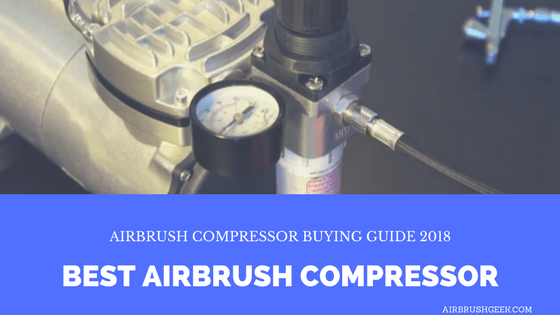
The aim of this airbrush compressor buying guide is to help you understand what you need to know before buying the best airbrush compressor.
If you are reading this post it means that you’ve already chosen the compressor as your air source.
You can find a compressor with tank, without tanks, some of them silent other rather noisy. Low-pressure air compressors (150 psi or less), Medium-pressure air compressors (151 psi to 1000 psi) or even high-pressure air compressors (more than 1000 psi). Airbrush compressor would fit in the “low-pressure air compressor “category.
So if you are going to use your compressor with an airbrush, I will assume that you will want to stay away from the “general purpose” medium-pressure air compressor that you can find at your local hardware. They are very noisy, can deliver generally more pressure that you would need with an airbrush and also can take a good bit of space. Saying that, those compressors are all equipped with an air regulator, and you could adjust the air pressure down to be able to work with an airbrush.
Like the choice for an airbrush, the choice the compressor will depend really on the type of work you are going to do with it. Different artists would have different needs.
Best Airbrush Compressor
If you are in a hurry, like most people are these days, please see below my selection of best airbrush compressors. Those compressors are all quiet airbrush compressors with tank, ideal when working with an airbrush. The only model in this list without a tank is the Iwata Studio Series Smart Jet , but even without a tank this is a great compressor, and I really mean it: Compact, quiet and reliable.
Airbrush Compressor Review
Timbertech AS186 Compressor
Make sure you check out my full review of the Timbertech AS186 airbrush compressor.
The Timbertech AS186 Airbrush Compressor is a single-piston oil-free and maintenance free mini compressor that works great if you are doing applications like miniatures models, illustration, cake decorating etc.Its compact and lightweight design makes it super easy to transport, thanks to the built-in carry handle.
It is equipped with an accurate scales pressure gauge that allows for careful adjustment of pressure according to different airbrushing needs. It has a safety valve that keeps the pressure stable, ensuring that your airbrush works continuously even under heavy pressure.
Timbertech AS186 Compressor: Powerful and Compact Airbrush Compressor
Master Airbrush Cool Runner II Dual Fan Air Tank Compressor
Crafted with precision and reliability in mind, the Master Airbrush Cool Runner II Compressor with L Air Tank is a game-changer for airbrush enthusiasts. The dual piston motor powers through tasks with ease, providing a steady and consistent airflow crucial for achieving flawless results in various applications. Its 3-liter air tank minimizes pulsation, ensuring uninterrupted operation, while the auto start/stop feature enhances energy efficiency and prolongs the compressor’s lifespan. Additionally, the compressor’s quiet operation and compact design make it a practical choice for artists working in shared spaces or tight quarters. Overall, the Cool Runner II compressor embodies reliability, versatility, and performance, making it a valuable addition to any airbrushing setup. Another compressor that deserves deserve to be on this list of best airbrush compressor.
Master Airbrush Cool Runner II Dual Fan Air Tank Compressor
Cool Tooty NO NAME by SprayGunner airbrush compressor
The No-Name Cool Tooty Airbrush Compressor is a performant , sturdy and well built airbrush compressor.With its 1/6 HP oil-less motor and its 3L metal tank, it is able to provide a quality and consistant airflow of 20-23 litre per minutes for any airbrush with a nozzle size up to 0.7mn. It has an improve cooling system that allows the compressor to work for longer without getting hot. Noise level is also kept to minimum with this No Name compressor as it is producing only 47db.It has a auto start/auto stop mechanism and moisture trap which are very nice features for a compressor at that price. Really , this compressor is one of my favorite and it totally deserver to be at the top of my list of best airbrush compressor. Nice to know as well that the quality control for each of those No Name compressor is made in Florida, in the USA.
Iwata IS 850 Smart Jet Pro compressor
The Iwata Smart Jet Compressor is an oil less piston compressor, in other words, this compressor is absolutely a zero-maintenance compressor. The Smart Jet is a compact, powerful, reliable and also a very quiet airbrush compressor. It features the auto-shut-off technology.
The auto-shut-off technology decrease the compressor running time and the chance for the compressor to overheat, therefore reducing also possible heat-related moisture build-up in the line.
The preset air flow produces a working pressure of 20-25 PSI and the bleed valve may be used to lower the pressure. An built-in airbrush holder and Iwata airbrush hose are included.
Overall the Iwata Smart Jet Compressor is a great, robust, compact and silent airbrush compressor.
This is another Iwata Studio Series compressor, oil-less piston motor (low maintenance like the IS 850) , very powerful, compact and quiet. The Power Jet Pro is twice as powerful as a Sprint Jet, so you can run two fine airbrushes or one high-flow airbrush or a small low-volume spray gun at low pressure.
It has dual air regulators and gauges for setting the pressure for each airbrush independently. The Power Jet Pro has a 2 litre tank reservoir, which increases moisture separation and smoothest out the air flow. This type of machine is preferred when heavy use is expected or higher pressures required. This would be the perfect compressor for airbrushing t-shirt for instance where higher air pressure is required.
This might not be a compressor that suits all budget, but it is a really a well built, reliable, quiet compressor that can really delivers smooth uninterrupted airflow when airbrushing. Highly recommend it.
Badger TC910 Aspire Review
1/5 Horsepower with a maximum pressure 57 PSI (4 bar). Another contender in the best airbrush compressor title!
The Badger TC910 Aspire is a quiet and lightweight compressor with automatic shut-off technology . It has a maximum air pressure of 57 psi (4 bar). It comes with an adjustable air regulator and pressure gauge, a 1 gallon (3 liter) built-in tank (as opposed to the Aspire TC909 that has no tank), a built-in moisture filter and two airbrush holders, one for gravity fed airbrush and one for siphon fed airbrush. Very handy to have.
The 1 gallon tank holds enough pressure for about 3-4 minutes at 20 PSI before the motor kicks in. The tank provides a smooth flow of air with no pulsing.
The Badger TC910 Aspire has an 1/8th inch hose connection including a 1/8th to 1/4th inch hose adapter.
Overall this a s a very well made compressor, compact and lightweight with a very sturdy outer metal case with non-slip feet, that has an handle for easy transport.
Great Airbrush compressor.
What you need to know about Airbrush compressors
Before I start with this guide I wanted to mention few things that you need to consider before buying a compressor:
How much power for the airbrush compressor?
The number of watts consumed, generally about 150 or200 w
What is the flow rate of an airbrush compressor (Airflow) ?
The airflow, or the quantity of air that the compressor can deliver, is be measured in CFM (cubic feet per minute) or lpm (litre per minute). Most of them would have an air flow capacity between 20 and 50 lpm (0.70 to 1.76 CFM).
What is the Maximum working pressure of an airbrush compressor ?
It will indicate air pressure the compressor can reach; usually measured in PSI (pound per inch) or bar. Make sure the compressor you are interested in buying will provide enough air pressure for the application. Spraying on T-shirt will require more pressure than spraying on nail or body.
What is the capacity of the tank?
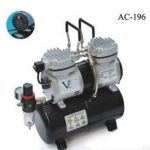
A compressor tank eliminates any pulsing and cools the air so the moisture separator will work better.
Although some small compressors have no tank, when they do have one, most of them have a capacity between 0,4 l – 1 l – 4 l – 6 l – 9 l – 12 l – 15 l when used with an airbrush but can go up to 25l for heavy duty compressors. I would recommend buying a compressor with a tank if you have the budget for it.(see “Questions to ask yourself before buying a compressor”)
Output Thread or outlet
For tank-based compressors, the output thread is generally 1/4 “. For small dry piston compressors, it is more often 1/8 “.
Auto-stop function
this will allow you to set up the compressor to stop functioning when a specific air pressure is reached and to start again when the air pressure go down under specific pressure value. Very nice feature that will reduce the running time of the compressor and therefore also the motor wear.
Questions to ask you before buying a compressor
They are few questions you should ask yourself before buying a compressor:
What Application?
Do you need to paint large area? Then you will probably be better with a compressor with a tank. Small area? Paint on body? (You are going to need a compressor with air regulator to deliver very low air pressure) Nails? Spray cars? Or even spray food coloring?
The choice of your compressor will depend on of what you are going to do with it.
If you are into illustrating, fine art, or if you need to paint a large area, I would recommend a compressor with a tank. You will able to paint continuously for a longer time with a consistent airflow. When the tank is full, the motor turns itself off, allowing it to rest.
Same thing, you won’t be able to use a small tank-less compressor along with a 0,6 mm nozzle. It won’t be able to deliver that crucial constant a regular airflow that you need.
If you are a make-up artist, painting body art, or you are into cake decorating, a compressor with a tank is not necessary. You will need something portable that can deliver low air pressure. Compressor such as Iwata Studio Series Ninja Jet would be suited for those applications.
If you are planning to spray on textile T-shirts, you will need a compressor that delivers at least 40 psi and equipped with a tank. A model such as the Iwata Studio Series Power Jet Pro compressor would be suited for this.
What about the compressor noise?

Are you planning to spray on plastic models in the evening time when your kids are in the room next to you trying to go asleep? Is your wife watching TV in the next room? In that case, believe me, you should consider buying a silent compressor.
Compressors that you can find in your local hardware shop can be very noisy. They can reach 85 or 90 decibels (dB), or more. It can be harmful to your hearing if you are exposed to that amount of noise for a long period of time.
Thankfully, compressors for airbrush artists have the advantage to be much quieter than you average hardware shop compressor and some of them are even considered silent. Of course, such an advantage has also a drawback which is in that case, you have guessed right: the price! The can be quite expensive to buy.
But if you have the means to do it, let me tell you won’t regret it.
Silent airbrush compressors would be the pistons compressor describe below
How long are you going to spray continuously for your project?
Are you going to spray for 20 minutes or more? In that case, a compressor with a large tank will be required. Or are you only going to spray for a minute or 2? You may want to consider those three elements:
Tank:
Unless you are working on basic projects, or as mention before. unless you are into nail art, or if you are a makeup artist, I would always recommend a compressor with a tank. The bigger the tank, the more autonomy you will have.
You will need to look at the air flow capacity and the duty cycle of the compressor.
Air flow:
If you are a Hobbit artist or art illustrator, I wouldn’t choose a compressor with less than 20 lpm (0.70 CFM). Those type of compressors would be more suited for application such as nail or body art, or makeup artists. For large jobs that require long continuous work, I would recommend a compressor with more than 30 lpm (1 CFM).
Duty cycle:
This is the amount of time the compressor is able to run continuously before having to stop to rest the motor.This will also avoid any damage done on the compressor and prolonged their life.The duty cycle is usually expressed in a percentage. A compressor with a duty cycle of 50% will run 30 minutes and then will need to rest 30 minutes to cool down.
9% Duty Cycle 5 Minutes On / 55 Cool-Down time
10% Duty Cycle 6 Minutes On / 54 Coo-Down time
15% Duty Cycle 9 Minutes On / 51 Cool-Down time
20% Duty Cycle 12 Minutes On / 48 Cool-Down time
Types of Airbrush Compressors
There are two types of airbrush compressors
-Diaphragm compressors
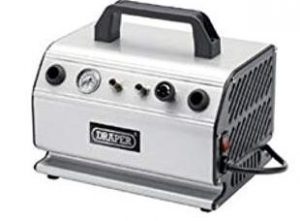
They are often considered as beginner compressors and could be a good choice for you if you are just starting airbrushing. On those model of compressors, it is a pulsating membrane that compresses the air. The air pressure delivered by those compressors can generally reach a maximum of 40 psi. So they are suitable if you connect to them a single airbrush and would be fine if you are spraying on small plastic models for instance.
Diaphragm compressors don’t have an air tank and run continuously when in use, so they can be noisy. Also, you should refrain using them continuously for too long, as they will overheat and can, therefore, be damaged.
-Piston Compressors
In those compressors, it is one or two pistons that compress the air. A two pistons compressor will compress a larger amount of air than a single piston compressor would.
It is probably the type of compressor I would personally recommend you to use if you are planning to use it along with airbrush.
Piston compressors are much more powerful than the diaphragm compressors. You could easily attach several airbrushes to a single compressor or run the compressor continuously longer than you would with a diaphragm compressor.
An air regulator should be attached to the compressor in order to be able to control\restrict the air pressure before it reaches the air hose. Those air regulators are generally equipped also with a moisture trap that will help to filter fluids and particles from the compressed air line.
There is two types of piston compressors:
Oil-filled piston:
For me, they are the Royce of the silent compressor. Very quiet compressors as the oil is acting as a lubricant. So they are particularly well suited if noise is an issue for you. Ideal for illustrating or fine art, they will allow you to work and stay concentrated. You can compare the noise they do to the noise of a fridge. An oil filter must also be attached between the air regulator\filter and the air hose. This will prevent any oil to go through your airbrush and mix with the paint (you definitely don’t want that!). Oil-filled piston needs a bit of maintenance as you need to check or sometimes replace the oil like in a car.
Oil-less piston:
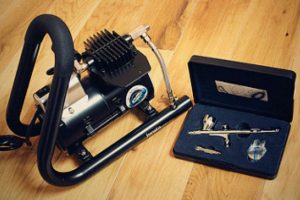
Although a little bit less quiet than the oil-filled piston compressors, those are still very quiet if you compare them to diaphragm compressors. The main advantage though is that they are low maintenance (no oil check\change). Ideal for nail painting, body art or cake decorating as you can be sure no oil will mix with the air.
3- Conclusion
I hope you will find those pieces of information useful for and that with them you will find easier to find the best airbrush compressor.
Now it is time to choose the right airbrush!
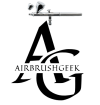




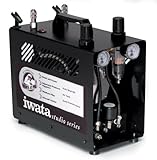
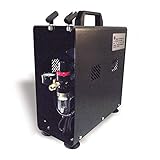







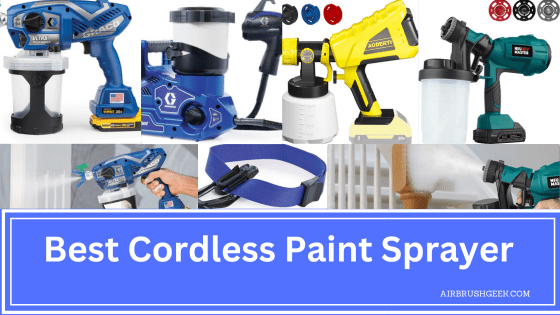
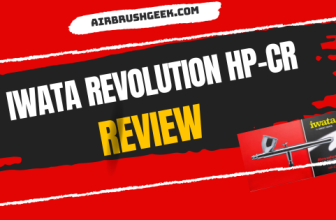
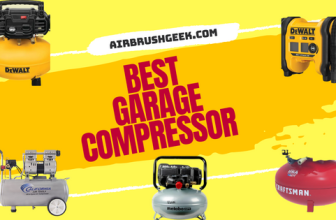

[…] Airbrush Compressor Buyer’s Guide 2017 […]
[…] for Best airbrush compressor is best done at a special paint store rather than at a general retailer. The personal should have […]